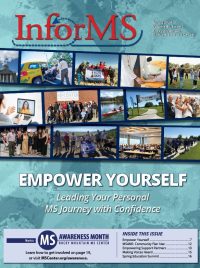
One of the best ways to empower yourself as a patient is to be well prepared for your neurology appointments. Typically, you’ll only see your Neurologist and extended Neurology team a couple times a year – maybe even less frequently, if you’ve been on your MS journey for a while, or if your disease is stable and your treatment plan is working well for you.
That’s not much time, when you consider how important your MS care is to the rest of your life.
At the Rocky Mountain MS Center at University of Colorado, a new patient visit is typically expected to run about one hour. Returning patients for routine office visits can expect about 25 minutes for their appointment, plus additional time (or possibly separate appointments) for specific testing, if needed.
Other neurology offices and MS specialists may vary the time they’re able to spend with patients. But regardless of where you get your MS care, it’s likely that you won’t have a lot of time with your neurologist.
Even in the best of circumstances, it’s important to make the most of the time you do have. And there are quite a few things a patient can do to ensure the best use of their in-office time.
What’s the Reason for Your Visit?
First things first, state your reasons for the visit clearly and up front. Is this a routine check-in? Are you due for annual testing, an MRI, or something else? Do you have any new symptoms that you think may be related to MS, or worsening of symptoms you already know about?
The answers to these questions will get you off to the right start. Your Neurology team will need to know about any changes in how you’re feeling and how your symptoms are doing, as these are often the best first indicators of either your MS’s stability, or any MS-related activity that needs to be looked into more deeply.
If you have any new, different, or worsening symptoms to report, make sure you’re ready with answers to questions your medical team will likely have, for example:
- When did these new symptoms begin?
- How long have they been going on?
- What do they feel like to you?
- What treatment have you received for these symptoms?
- What was your response to the treatment?
You’ll also want to make sure that your Neurology team is aware of anything else that might be going on with you, even if you know it’s not directly related to your MS. “Comorbidities” is a term you may hear your medical team use – while it sounds dire, it simply means “the simultaneous presence of two or more diseases or medical conditions in a patient.”
What makes comorbidities particularly important in MS is that many other illnesses can impact MS in various ways, so it’s critical that those caring for your MS know what else is going on with you. Comorbidities can impact everything from the disease modifying therapy (DMT) your neurology team prescribes, to basic advice on managing MS symptoms and caring for your general health.
Once these important initial items are out of the way, it’s time to move on to any concerns or questions you may have. It may be helpful to bring a list of the questions you would like to have answered, and if possible, you may even want to print two copies, and hand one to your doctor – that way, they can be sure to address anything that jumps out to them if you forget to mention it.
What to Bring with You
A well-prepared patient can make all the difference in how well an office visit goes, particularly for new patients. Whether you’re newly diagnosed, a new patient meeting a doctor for the first time, or meeting with your well-established medical team, there are a few things you can always have on hand to make things run more smoothly.
Medical records and notes from previous neurologists. First, your medical history. While today most medical records are electronic and at your medical team’s fingertips, it never hurts to be fully prepared with your own records.
Recent lab results, including MRI discs. If you’re visiting your regular Neurologist, it’s likely they already have these. But for new patients, or patients seeing a new doctor for the first time, it can save time and headache to have these items with you. If an MRI was ordered by another doctor or conducted at a different healthcare system, they may have provided your results on a computer disc. If so, be prepared to share that with your medical team.
List of current medications, including reasons, dosage, and name of the prescribing physician. As mentioned earlier, other medical conditions and their treatments can impact decisions and treatments related to your MS care. It’s critically important that your Neurology team is aware of all medications you may be taking, and why you’re taking them.
List or log of your MS-related symptoms. A thorough log of your MS-related symptoms can show your medical team changes over time, which you might not notice yourself. These indicators can be important in monitoring your MS.
List or log of any other health concerns or symptoms. Again, your Neurology team must be aware of anything else you may be dealing with, as it can show them that your MS care plan needs to be adjusted or monitored going forward. Additionally, since MS can cause such a wide range of symptoms that vary from patient to patient, a list of seemingly unrelated symptoms might be identified by your care team as a new symptom that is, in fact, related to your MS.
Bring a notebook for writing down anything you may need to know later. You’ll undoubtedly experience a flood of information in the short time of your medical visit, far too much for anyone to retain. A notebook or other means of taking down information can be a great way to keep track of things your medical team talks to you about. You may even consider using the Voice Memo function on your cell phone to record the discussion.
And finally, bring a support partner, trusted family member or friend with you, if it’s possible. Someone who’s knowledgeable about your condition and your care plan can serve as a second set of ears and help address any concerns that may not come to your mind immediately.
Use Technology
In recent years, technology has created new opportunities for patients to have better and more direct access to their medical team. Two of the most potentially beneficial developments for patients are pre-visit messaging systems and the expansion of telehealth. While these technologies can be intimidating to some, it’s worth learning to use and take advantage of these systems to help give yourself a better and more thorough experience.
Messaging systems are becoming more and more commonplace in healthcare settings, and are usually part of a “Patient Portal” or similar online system. You may have experienced these as an email or text-based pre-visit check-in, which is of course convenient and may help expedite the routine parts of an office visit.
But if your medical office is making full use of a messaging system, it gives you a new opportunity to address concerns directly with your medical team. For an upcoming visit, you can send in any questions you may have beforehand to give your team time to prepare for thorough answers. And in time between visits, they can give you a place to ask questions or alert your Neurologist to any changes that may be relevant to your MS care.
Telehealth is an option for some medical visits that’s growing in popularity both for its convenience and for a relative safety provided by allowing patients to stay home if an office visit isn’t required.
Your MS team will certainly want to see you in-person regularly, but for routine check-in visits and at times where no additional testing is required, telehealth allows direct contact with your Neurologist without the need to travel to a medical office. Combined with the messaging system mentioned earlier, these new technologies offer patients unprecedented access to their medical teams.
EXPLORE MORE
MS Center Nurse Practitioners Pauline Sok and Grace Worland recently joined us for a Webinar entitled “Preparing for a Neurology Visit.” You can view this video in our webinar library at MSCenter.org/webinars.



